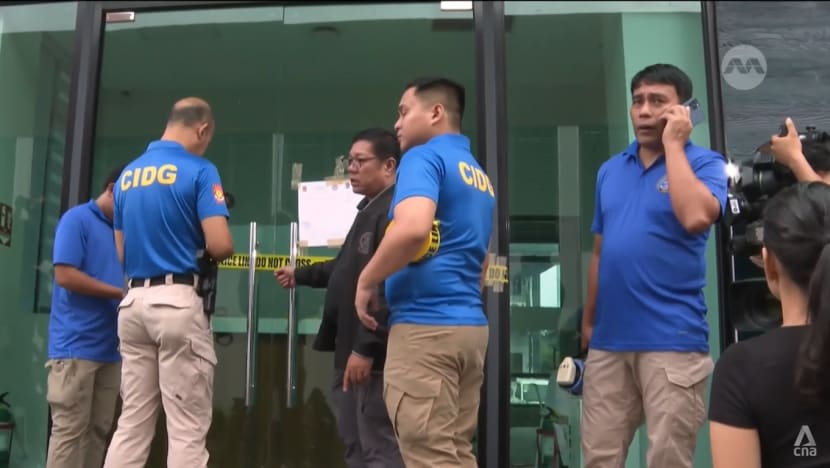Philippine laws seek to prevent online casino resurgence, plug loopholes uncovered in years-long probe
Primarily run by Chinese nationals, Philippine Offshore Gaming Operators (POGOs) started flourishing in 2016 during former President Rodrigo Duterte’s term.

President Ferdinand Marcos Jr announced the ban on Philippine Offshore Gaming Operators, setting a deadline for them to shut down on Dec 31.

This audio is generated by an AI tool.
METRO MANILA: Philippine legislators are seeking to pass multiple laws to address gaps in the areas like immigration checks, foreign interference and espionage monitoring, following years of investigation into crime-ridden online casinos catering to offshore clients.
Often referred to by their acronym POGOs, Philippine Offshore Gaming Operators were ordered banned by President Ferdinand Marcos Jr in a national address in July last year, citing social costs like rising crime.
A proposed law to prevent the resurgence of such offshore gaming operations is already pending in Congress.
“I hope the year 2025 is the year we finally pass the Anti-POGO Act. We need a comprehensive law to ensure that there will no longer be POGOs that scam, hurt and deceive people,” Senator Risa Hontiveros said in a statement early this year.
In an executive order signed in November, President Marcos formalised the ban and gave the national gaming regulator until the end of 2024 to wind down operations. But lawmakers said legislation would better institutionalise the ban.
In a bill pending in Congress, lawmakers have proposed to widen the scope of the ban to include POGOs licensed by other government agencies instead of just the gambling regulator cited in the president’s executive order.
"Our proposal expanded the definition to make sure that … regardless of who issued the licence, (it) will be captured in the law,” said Senator Sherwin Gatchalian in an interview with CNA.
“There's the risk that they (POGOs) might go underground, but I think law enforcement authorities have been very prudent about ensuring that these operations are seized before they proliferate further,” said Joseph Velasco, associate professor in the Department of Political Science and Development Studies at De La Salle University in the Philippines.
THE CASE OF ALICE GUO
Primarily run by Chinese nationals, POGOs started flourishing in 2016 during former President Rodrigo Duterte’s term.
“We saw a lot of loopholes in our system that enabled POGOs,” said Gatchalian, citing the case of dismissed mayor Alice Guo, who Philippine investigators determined to be Chinese national Guo Hua Ping.
She is alleged to have faked her Filipino birth certificate before running for public office.
Guo was able to co-own a firm with strategic real estate from which a raided POGO linked to human trafficking and money laundering rented land. She has been charged in court as a co-conspirator of the registered POGO owners.
Guo also managed to flee the country, but was arrested in Indonesia shortly after.

Allegations that she is a Chinese spy put a spotlight on the need for better monitoring of public officials’ engagements with foreign agents and bodies.
“She managed to influence key decision makers in the military and police, all while remaining undetected,” noted Gatchalian.
While Guo has maintained she is a natural-born Filipino citizen, denied spying allegations as well as other accusations against her, calling them malicious, her case exposed a potential web of corruption in both the country's civil registry and immigration.
Assoc Prof Velasco noted that Guo’s birth certificate was registered when she was 19 years old.“That is actually a red flag when it comes to allowing individuals to run for public office and government agencies should conduct due diligence when it comes to these individuals,” he told CNA’s East Asia Tonight.
Related:
WORKERS DEPORTED, LATE CIVIL REGISTRATION SUSPENDED
The Philippines is set to deport over 11,200 foreign nationals involved in POGOs, the country’s immigration bureau announced last week. This was on top of the 22,600, who already left the country before the Dec 31 deadline for the shutting down of POGOs.
Bureau of Immigration commissioner Joel Anthony Viado said that POGOs are required to surrender their foreign workers to authorities, as hiding them can lead to being sued for harbouring illegal aliens.
The bureau’s intelligence division has been ordered to initiate the search for those at large.
“Expect an intensified manhunt against these illegal aliens. The order of the President is clear. No more POGO in the Philippines. Foreign nationals who continue to disobey this will be arrested, deported, and blacklisted. No exceptions,” said Viado.
Likewise, government lawyers are set to jumpstart proceedings to revoke birth certificates fraudulently acquired through the late registration system the way Guo was able to, according to local press reports quoting the Philippines’ solicitor General Menardo Guevarra.
Senator Hontiveros also urged government lawyers to repossess assets of POGOs.
“These properties should then be used as reparation for human trafficking victim-survivors, as stated in the Anti-Financial Account and Scamming Act,” she said.
PROPOSED LAW TO DETER FOREIGN INTERFERENCE
As allegations of espionage emerged in Guo’s case, experts have also urged Congress to pass a law to address foreign interference.
Senior research fellow at the Ateneo School of Government Rommel Jude Ong, who co-authored a draft bill, told CNA the proposed law seeks to deter and sanction actions that may lead to malign influence or foreign interference.
The proposal involves requiring disclosures on foreign funding or support from individuals conducting lobbying activities or disseminating political propaganda, even if such funding or funding support is not for the purpose of conducting political influence activities for the foreign principal.
It also seeks to regulate sub-national foreign engagements by requiring prior notification to the Department of Foreign Affairs with a few exceptions.
Under the proposal, contact reports with foreign agents are required of any public officer, contractor or consultant with security clearance to access or handle state information or matter classified as secret or top secret or highly sensitive.
As the country weeds out POGOs, tens of thousands of Filipinos who worked for them will also be left unemployed.
In a recent raid on a POGO hub in northern Philippines, workers CNA spoke to expressed uncertainty about their futures.
As the Philippines winds down the gambling sector, experts said the nation would still need to tackle underlying systemic issues like corruption and limited job prospects that allowed crime-ridden POGOs to thrive.

















